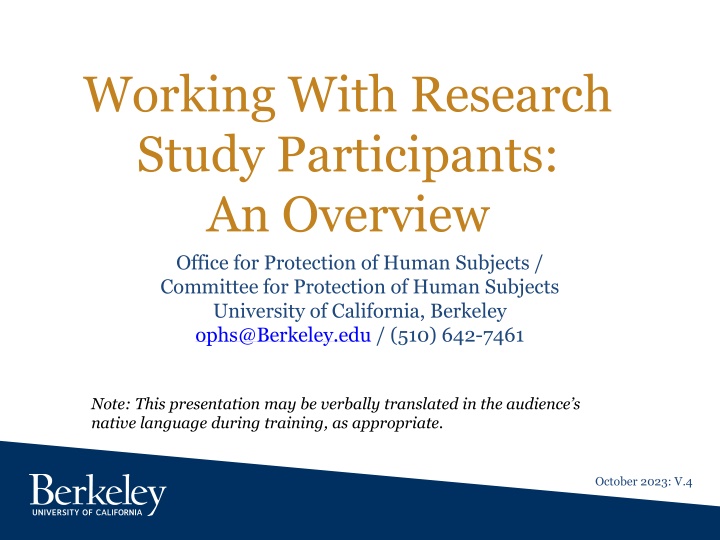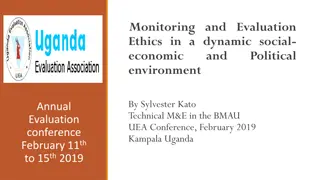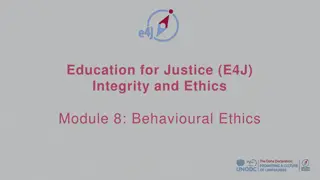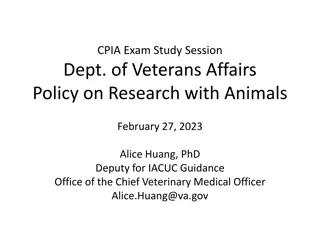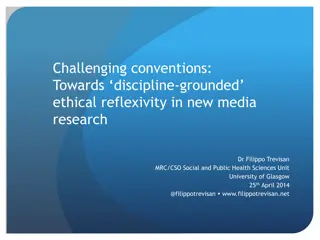Ethical Practices in Research Studies: Guidelines and Responsibilities
This overview covers key aspects of working with research study participants, including ethical principles, protecting privacy and data security, team responsibilities, and important research ethics highlights. It emphasizes the importance of thorough training, understanding ethical principles, and maintaining effective communication to protect study subjects and ensure integrity in research endeavors.
Download Presentation

Please find below an Image/Link to download the presentation.
The content on the website is provided AS IS for your information and personal use only. It may not be sold, licensed, or shared on other websites without obtaining consent from the author.If you encounter any issues during the download, it is possible that the publisher has removed the file from their server.
You are allowed to download the files provided on this website for personal or commercial use, subject to the condition that they are used lawfully. All files are the property of their respective owners.
The content on the website is provided AS IS for your information and personal use only. It may not be sold, licensed, or shared on other websites without obtaining consent from the author.
E N D
Presentation Transcript
Working With Research Study Participants: An Overview Office for Protection of Human Subjects / Committee for Protection of Human Subjects University of California, Berkeley ophs@Berkeley.edu / (510) 642-7461 Note: This presentation may be verbally translated in the audience s native language during training, as appropriate. October 2023: V.4
Interacting with Research Subjects An overview on how to: Share information about a research study with potential subjects who may volunteer for the study; and Interact with subjects throughout the study (e.g., conducting the informed consent process, administering surveys, interviewing, leading focus groups). 2
Learning Objectives / 1 After this presentation, you should be able to: Name and understand the three basic ethical principles described in The Belmont Report; Implement these ethical principles when working with research subjects, - including research in international settings 3
Learning Objectives / 2 Learning Objectives / 2 Understand how to help protect participants privacy; and How to help keep subjects study data secure (confidentiality). 4
The Research Team / 1 Our ethical responsibility is to protect the study subjects. Thorough training in how to recruit and interact with subjects, conduct the study procedures, and maintain effective communications are all key to the process. 5
The Research Team / 2 Each team member should understand his/her role in the study. All questions about the study now or later should be directed to [name UC Berkeley PI or designee] 6
Research Ethics Highlights Declaration of Helsinki (1964) This protocol should be submitted to a specially appointed ethical review committee, which must be independent of the investigator, the sponsor or any other kind of undue influence. Nuremberg Code (1948) The voluntary informed consent of the human subject is absolutely essential. Tuskegee Syphilis Study (1932-72) National Research Act (1974)
The Belmont Report The Belmont Report identifies the ethical principles upon which the federal regulations for human subject protections are based. Respect for persons Beneficence Justice Reading this short document is highly recommended; see Additional Resources (final slide). 8
https://encrypted-tbn3.gstatic.com/images?q=tbn:ANd9GcR2Mnk5ISEaruVfkPeg-c7sRaNJOV6QpQbup9EPr9G2QuoiP94phttps://encrypted-tbn3.gstatic.com/images?q=tbn:ANd9GcR2Mnk5ISEaruVfkPeg-c7sRaNJOV6QpQbup9EPr9G2QuoiP94p Belmont Ethical Principles: Respect for Persons / 1 The autonomy of the individual must be acknowledged and respected. Informed consent. Voluntariness ability to decide to participate in research and to withdraw at any time, without coercion or undue influence from others. 9
Belmont Ethical Principles: Respect for Persons / 2 Individuals with limited autonomy must receive additional protections. The limits May be inherent (e.g., limited capacity to understand and process information). May be situational (e.g., prisoners, children, and pregnant women and fetus/neonates)
Belmont Ethical Principles: Beneficence / 1 Researchers obligation to endeavor to do no harm, minimize any risks and maximize any benefits of the research. Use procedures that are the least risky. Risks include physical, psychological, legal, social and economic harms. 11
Belmont Ethical Principles: Beneficence / 2 Benefits may be To individual subjects; and/or To others (e.g., to basic research, to a community, or to society as a whole). . 12
https://encrypted-tbn3.gstatic.com/images?q=tbn:ANd9GcTSU_FeUogjG0uEHnHTfAQxW5jOzWf5OwCF5O61znPnuOfruB-thAhttps://encrypted-tbn3.gstatic.com/images?q=tbn:ANd9GcTSU_FeUogjG0uEHnHTfAQxW5jOzWf5OwCF5O61znPnuOfruB-thA Belmont Ethical Principles: Justice Treat individuals fairly. Design research such that its burdens and benefits are shared equitably. 13
Informed Consent Informed Consent (IC) is often misinterpreted as merely obtaining an individual s signature on a form (or a yes response in a verbal consent process. Actually, IC is a process of education and decision-making that begins with the very first contact with a potential study subject (i.e., during recruitment). 14
Knowledge Quiz According to the Belmont Report, what are the three basic ethical principles upon which the human subjects protections are based?
IC Begins with Recruitment / 1 Study staff who recruit subjects should keep in mind that this step is also part of the IC process. While initial information shared with potential subjects will be briefer than what is contained in the IC document, care should be taken during initial contacts to provide only accurate information (i.e., consistent with the IC documents/study procedures). 16
IC Begins with Recruitment / 2 Regulations permit initial discussions about the study to occur in a group setting or one-on-one. A setting can be selected for reasons that are practical or based on cultural considerations. When recruiting in group settings (e.g., informational meeting, classroom) make sure that there s a way for subjects to raise questions/agree to participate in private (i.e., not in front of colleagues/classmates, etc.) Be sure to notify potential subjects of this option. 17
The IC Process For those individuals who decide to participate, the IC process continues throughout the study. It is an ongoing dialog that includes providing new information (e.g., changes in risk factors) that may impact the decision to continue in a study. 18
Goals of the IC Process To build with each potential/enrolled subject: A trusting relationship and open dialog. An understanding of the essence of a study so that s/he can make a truly informed, autonomous decision about whether to participate. 19
Cultural Considerations / 1 Iceberg model of culture developed by Selfridge and Sokolik, 1975 and W.L. French and C.H. Bell in 1979, https://zestnzen.wordpress.com/2012/01/26/how-to- understand-cross-cultural-communication/ 20
Cultural Considerations / 2 Key factors: Trying to remain aware of our own biases. Educating ourselves and asking for help. Being sensitive to and curious about cultural differences (i.e., asking, not assuming). 21
From the Outset, Potential/ Enrolled Subjects Need to Know: The study constitutes research. It is entirely up to them whether they participate or not. They are free to skip questions (e.g., during an interview), or stop participating in the study at any time without having to share their reason(s) for doing so. 22
The Informed Consent (IC) Process / 1 People approach volunteering for a study with preconceived ideas and life issues that may impede true informed consent. It is the research team s responsibility to identify and address these issues as part of the IC process. 23
The IC Process / 2 Some potential subjects may adopt a Give me the form, I ll just sign it approach. However, the key points about a study should always be reviewed as part of the process. 24
Tips for the IC Process / 1 IC discussions should take place in a quiet, private location. If IC occurs via phone, check to see if it s a good time for the person to talk, and if s/he is in an appropriate location. 25
Tips for the IC Process / 2 Some potential subjects may be reticent about asking questions (e.g., shy, do not want to appear dumb, etc.) Avoid passive acceptance when a potential subject states s/he has no questions. To facilitate understanding, encourage a subject to repeat in his/her own words the key points about a study. 26
Tips for the IC Process / 3 If a potential subject seems stressed or anxious, it will likely be hard for him/her to assimilate the IC information. Consider offering to reschedule the discussion. If the individual wishes to go ahead, slow things down by going point-by-point, encouraging his/her input, and/or summarizing the responses. 27
Tips for the IC Process / 4 In general, encourage potential subjects to take their time (e.g., ask questions, take the form home, talk to friends/family, etc.) 28
Knowledge Quiz T/F: Informed consent is an ongoing process that starts at recruitment and continues until the end of study participation.
Study Materials Staff who recruit or work with study participants should verify with the PI/designee that only the most recent IRB-approved materials --e.g., flyers, phone recruitment scripts, interview consent documents, surveys/questionnaires, or debriefings are being used. 30
Tips on Data Collection Follow study instructions (e.g., study SOP) for completing surveys/questionnaires/interviews. Do ask the questions as intended in the research. Don t rephrase or shorten the questions to save time. Be mindful that participants are free to skip questions or stop participation in the study at any time. Record the responses completely and accurately. Extraneous information that is not included in the survey or questionnaire should not be collected/recorded.
Privacy and Confidentiality / 1 These terms are sometimes confused. Privacy pertains to control over the extent, timing, and circumstances of sharing oneself (physically, behaviorally, or intellectually) with others. 32
Privacy and Confidentiality / 2 Confidentiality pertains to the treatment of information that an individual discloses in a relationship of trust. It involves the expectation that information will not be divulged to others-- without permission--in ways that are inconsistent with the understanding of the original disclosure. 33
Protecting Subjects Privacy: Examples / 1 When an individual other than the subject answers the phone, ask for subject by name but withhold the context (e.g., do not share that the call is about a research study; do not name study, etc.) Be sensitive to privacy issues when leaving voice mail messages. Check with the subject to see if it is okay to leave messages. 34
Protecting Subjects Privacy: Examples / 2 Avoid scheduling interviews on sensitive topics in public places. Close exam room curtains when conducting physical exams. 35
Protecting Confidentiality: Examples / 1 Share subject study data only with appropriate study team members. Keep signed consent forms and other documents containing identifiable data in a secured location. Encrypt and password-protect all identifiable data files including all audio and/or video recordings. 36
Protecting Confidentiality: Examples / 2 Keep memory sticks, laptops and other removable media secured when not in use. Keep participant names/study identification codes in a separate, secure location from all other study data. Additional confidentiality measures may also apply when studies are subject to the EU General Data Protection Regulation (GDPR), and other countries with their own data protection requirements. 37
Informed Consent, Privacy and Confidentiality / 1 The study consent documents provide an explanation of the extent to which the confidentiality of private data identifying subjects will be maintained. Familiarize yourself with the study consent documents and our study team data security plan. Apply these standards in your day-to-day work. 38
Informed Consent, Privacy and Confidentiality / 2 An unintended breach of confidentiality is a risk factor for any research study. Since complete confidentiality of research data cannot be guaranteed, avoid any wording that implies such assurance. 39
Knowledge Quiz How is the concept of privacy and confidentiality different? Give an example of how to protect the confidentiality of identifiable data?
Deviations from Study Procedures Instances when IRB approved study procedures are not followed: - inadvertent mistake - sometimes necessary to deviate in order to protect participants All protocol deviations and non-compliances must be promptly reported to the UCB PI/designee and to CPHS.
Unanticipated Problems and Adverse Events / 1 Despite a study team s best efforts, unanticipated problems (e.g., a confidentiality breach; using an outdated version of a study questionnaire; person faints during a blood draw) do happen. 42
Unanticipated Problems and Adverse Events / 2 It is very important that study team members report any unanticipated problem or adverse event as soon as possible to [name UC Berkeley PI or designee]. The PI assumes overall responsibility for the study. 43
Research in International Setting / 1 When HHS-supported research takes place outside of the United States questions about fair treatment and fair standards may arise. This may be especially true of research conducted in countries where: Resources may be scarce and/or Other vulnerabilities may be pronounced
Research in International Setting / 2 A few of the many issues that demand careful consideration with respect to justice, as well as beneficence and respect for persons, include: How can research conducted in resource-poor setting avoid exploiting participants? What is owed to participants in clinical research and to the population of the host country after studies are complete? In addition to following the HHS regulations, what standards and assurances to protect research participants should investigators and non-US institutions use when conducting research abroad? How can regional or cultural differences be negotiated? For settings where cultural values impact informed consent, how should processes be altered?
Knowledge Quiz 1. T/F: Vulnerable subject populations do not have special protections under the federal regulations (45 CFR 46 Subparts B, C, D). 2. Do No Harm is part of which Belmont Ethical Principle? 3. T/F: Study staff must only use IRB-approved study documents to obtain informed consent and conduct study procedures. 4. Conducting interviews in a discreet location is an example of ________ protection. 5. When a deviation from the protocol or an unanticipated problem has occurred, when and to whom do you report the event?
Thank you for your attention! Questions? http://www.mediatrainingworldwide.com/blog/wp-content/uploads/2011/06/110413-interviews.jpg June 2016
Additional Resources The Belmont Report https://www.hhs.gov/ohrp/regulations-and-policy/belmont-report/index.html CPHS Data Security Guidelines & Matrix https://cphs.berkeley.edu/datasecurity.pdf CPHS Reporting Unanticipated Problems & Adverse Events https://cphs.berkeley.edu/unanticipated_problems_adverse_events.pdf Human Subjects Research Training Guide for International Enumerators https://cuhs.harvard.edu/files/cuhs/files/enumerator_training_-_irb.pdf 48
